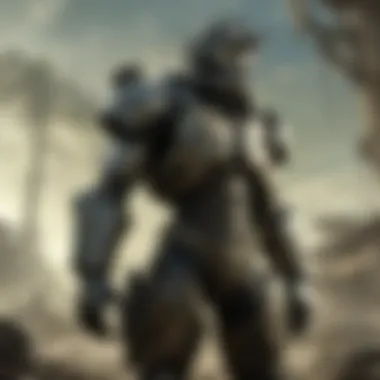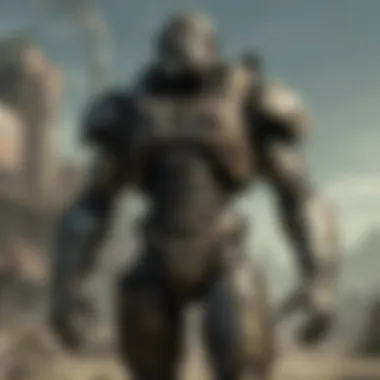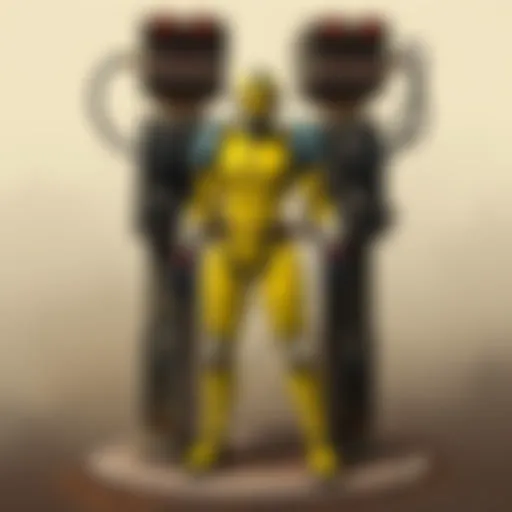Exploring Fallout 3: Game of the Year Edition on Xbox One


Lore Insights
The Fallout universe invites players into a post-apocalyptic world that is as diverse as it is dangerous. Set in an alternate timeline where the nuclear arms race spiraled into catastrophe, the series is steeped in rich lore, crafted through clever narratives and intricate world-building. Fallout 3, particularly in its Game of the Year Edition, expands this lore, allowing players to explore the wreckage of Washington D.C. and its surrounding wasteland.
Overview of the Fallout Universe
In the Fallout universe, the world as we know it ended after a series of nuclear wars, and humanity was pushed underground into vaults built to withstand the devastation. The remnant human population faced countless obstacles: mutated creatures, radiation, and the collapse of societal norms. Characters like the Vault Dweller and the Lone Wanderer traverse these desolate landscapes while uncovering secrets about humanity’s past and the darker sides of human nature. Fallout 3 encapsulates this struggle brilliantly, drawing players into a tale of survival, exploration, and moral dilemmas.
Key historical events in the Fallout timeline
- The Great War (2077): This catastrophic series of nuclear strikes led to widespread devastation and set the stage for the world seen in Fallout.
- The Reclamation: In the aftermath, various factions emerged, seeking to rebuild and assert control. Notable examples include the Brotherhood of Steel and The Enclave.
- The Capital Wasteland: Players find themselves in this landscape, which is rich in both history and conflict, with remnants of the pre-war government still scattered throughout.
Understanding these events enhances the gameplay experience, grounding players in the historical weight of their actions and the choices they must make.
Deep dive into the backstory of major factions and characters
Fallout 3 introduces a variety of factions, each with its beliefs and goals. The Brotherhood of Steel believes in preserving technology and knowledge. In contrast, The Enclave, comprised of remnants from the pre-war government, seeks to eradicate anyone they deem unworthy. Players encounter these factions through quests, often finding themselves at odds or allied with them based on their choices.
Moreover, iconic characters like Three Dog, the DJ of Galaxy News Radio, or President John Henry Eden, the AI leader of The Enclave, add layers of depth. Their backstories and motivations enrich the narrative and allure players to explore their fates within the game.
"The post-apocalyptic setting of Fallout is not just a backdrop, it is a character in itself, shaping the players' journey and decisions like no other."
In this vast lore-filled landscape, every decision reverberates through the narrative and alters the trajectory of the player's journey, creating a uniquely rich experience.
Gameplay Tips and Strategies
Navigating the wasteland is no small feat, and having a solid understanding of gameplay mechanics is essential for maximizing your experience in Fallout 3. Here are some pointers for both new and returning players.
Preface
Exploring Fallout 3: Game of the Year Edition on Xbox One reveals the rich tapestry of an iconic gaming experience that remains impactful even years after its initial release. The significance of this title in the franchise should not be overlooked. This edition not only brings forth an expansive open world but also showcases a combination of immersive storytelling, robust character mechanics, and innovative gameplay. The blend of these elements allows both veterans and new players to dive deeper into the post-apocalyptic wasteland that has become a hallmark of the Fallout series.
In this article, we will navigate through the intricacies of the game, illuminating its features and the enhancements that come with the Game of the Year Edition. Gamers who dive into this powerful remaster will find that it brings a polished experience while ensuring the core of the original game shines. The exploration of various gameplay mechanics, character progression, and narrative depth will serve to underscore why this edition is a must-play. Whether revisiting the wasteland for nostalgia’s sake or fresh in the journey, players are encouraged to grasp the full breadth of what Fallout 3 offers.
Overview of Fallout
Fallout 3 stands as a pivotal chapter in the gaming world, a title that shifted perceptions about how open-world games could present narrative and player agency. Released in 2008 by Bethesda Game Studios, it took the series into a fully realized 3D setting, straying away from its predecessors’ more isometric perspectives. Set against the backdrop of a ravaged Washington, D.C., the game invites players to step into the shoes of the Lone Wanderer, emerging from the safety of Vault 101 to navigate a desolate landscape filled with remnants of civilization and dangers lurking behind every corner.
The world is sprawling and richly detailed, from the eerie stillness of ruined streets to the haunting whispers of a history long past. Players encounter ghouls, mutated creatures, and the remnants of various factions, each woven into a narrative filled with depth and moral complexity.
As players traverse this post-apocalyptic land, the choices made not only impact the immediate gameplay but also resonate throughout the broader storyline, making every decision a weighty consideration.
Significance of Game of the Year Edition
When discussing the Game of the Year Edition, it's crucial to acknowledge its role in enhancing the original experience. This edition brings forth not only the main story but also an extensive range of downloadable content that expands the narrative and gameplay significantly. The integration of expansions like Operation Anchorage, The Pitt, Broken Steel, Point Lookout, and Mothership Zeta adds layers of exploration and adventure, each bringing its own flavor. This content mixes seamlessly with the base game, giving players opportunities to experience new stories, encounters, and locations, all while layering on the experiences that make Fallout 3 a standout title.
Moreover, the improved graphics and performance optimizations for Xbox One elevate the already striking environments, enriching the visual storytelling. All these enhancements give players a sense of nostalgia while also inviting them to experience this classic in a contemporary light. The Game of the Year Edition is more than just a re-release; it is a celebration of what makes Fallout 3 a beloved entry in the series, ensuring its legacy continues for both old fans and newcomers alike.
Gameplay Mechanics
Exploring the gameplay mechanics in Fallout 3: Game of the Year Edition lays the groundwork for understanding the immersive experience it delivers. The mechanics are not just technical structures that govern how players interact with the game; they are vital for establishing the game’s atmosphere and pacing. The complexity and depth of these mechanics also form the backbone of player engagement and replayability.
Exploration and World-Building
One of the standout features of Fallout 3 is its vast, open-world environment. This isn’t just a large map; it is a carefully crafted post-apocalyptic landscape that tells a story of its own. The Capital Wasteland is brimming with forgotten remnants of civilization, and players are encouraged to explore its nooks and crannies.
The environmental storytelling is rich here. Each dilapidated building or hidden underground vault does not merely serve as a backdrop; they offer snippets of lore, hinting at the world before the Great War. This exploration is often rewarded with items, quests, and a deeper understanding of the game’s narrative.
When players wander into uncharted territories, they might come across subtle narratives woven into the locations or discover old holotapes that paint a picture of the lives once lived. This deep sense of world-building is what makes wandering off the beaten path not just a random choice, but an integral part of the Fallout 3 experience.
Combat System


The combat mechanics in Fallout 3 are as welcoming as they are intricate. The game offers both real-time shooting and a turn-based system known as VATS, which allows players to strategize their moves intelligently.
VATS System
The VATS system—short for Vault-Tec Assisted Targeting System—provides a unique twist to combat by allowing players to slow down time and target specific body parts of enemies. The tactical element introduced by VATS transforms each encounter into a blend of strategy and action.
Key characteristics of this system include:
- Precision: Players can aim for critical areas—like a headshot or a leg—to effectively manage foes.
- Graphical Feedback: The animations during VATS tend to be graphic, adding a bit of flair that some players find engaging.
However, it’s important to note that while this system proves beneficial, especially for newcomers, it can detract from the urgency of quick reflex encounters.
Weapon Customization
Weapon customization is another integral feature, allowing players to tailor their arsenal to match their play style. Each weapon can be modified with various parts, from barrels to scopes, enhancing both efficacy and aesthetics.
A key characteristic of weapon customization is the diversity it brings; players can transform a simple pipe rifle into a killing machine with just the right parts. This customization becomes a personal expression of how players engage with the world.
Unique features include:
- Modifications: Hulk-like shotguns, sniper rifles that can pick off mutants from a mile away, players can make choices that reflect their combat strategy.
- Limitations: However, finding specific parts can sometimes be a challenge, requiring scavenging that can be arduous, testing the player’s patience.
Quest Structure and Choices
Fallout 3 excels not only in crafting a world but also in its quest structure. Choices play a crucial role in shaping the events of the game. Quests aren’t just linear journeys; they often present players with decisions that have far-reaching consequences.
This branching quest design allows for a multitude of play styles. You can opt for diplomacy or brute force, fostering a sense of agency as players navigate moral quandaries that can affect the game world. The repercussions of your actions create a feeling of authentic risk, prompting players to carefully consider their options as they unveil different storylines.
In summary, the gameplay mechanics of Fallout 3: Game of the Year Edition serve as the linchpin for an engaging, strategic, and emotionally resonant gaming experience. By marrying exploration, combat intricacies, and meaningful choices, players find themselves deeply immersed, with each session promising to unveil something new.
Enhanced Features in the Game of the Year Edition
The Game of the Year Edition of Fallout 3 is not simply a re-release; it’s a comprehensive package that encapsulates the essence of the post-apocalyptic universe while enhancing gameplay for both newcomers and seasoned veterans. With the inclusion of downloadable content (DLC) and graphical upgrades, this edition not only rekindles old memories but also revives the game with fresh zest. Understanding these enhanced features is essential for appreciating how they enrich the Fallout experience.
Integrations
The Game of the Year Edition integrates five notable DLCs, each adding unique narratives and gameplay mechanics to the core experience. These expansions do wonders, introducing new locations, quests, and characters, which in turn deepen player engagement. Here’s a closer look at what each DLC brings to the table:
Operation Anchorage
Operation Anchorage is a thrilling, mission-based DLC that transports players back to a simulated version of the battlegrounds in Alaska. It offers a taste of tactical combat as players engage in a war against the Chinese Army, an element not heavily featured in the main game. One key characteristic of this expansion is its linearity. Unlike the vast exploration of the Capital Wasteland, Anchorage is more focused and structured, making it easier for newcomers who might feel lost in the vast open world.
The unique feature here is the ability to earn exclusive gear that carries over into the main campaign, allowing for an alternate gameplay style. However, some players might find this shift away from the open-world freedom a bit restricting.
The Pitt
The Pitt graces players with a view into a rusty, industrial landscape where moral choices weigh heavily. In this DLC, players traverse a post-apocalyptic Pittsburgh, uncovering a trade between the enslaved and their captors. It’s rich in narrative depth, allowing players to grapple with issues of ethics and survival.
A key aspect of The Pitt is its emphasis on consequences; decisions made here ripple throughout the experience, echoing the series’ theme of choice and consequence. Its atmospheric design and compelling storyline render it a popular choice for fans who appreciate lore-rich experiences. However, the combat can occasionally feel unbalanced, creating moments where gameplay overshadows narrative.
Broken Steel
Broken Steel is perhaps the most crucial DLC as it continues the storyline past the original game’s conclusion, allowing players to raise their level cap and enhance character development further. This expansion effectively wraps up the main narrative, introducing new quests and enemies that keep the gameplay fresh. One of its most significant features is the addition of the Experience Points system, which transforms how players progress, ensuring the game feels expansive beyond the original ending.
This DLC is highly beneficial, providing closure and a sense of continuity. The only downside might be that it slightly alters the game’s pacing, which some players may find less appealing.
Point Lookout
Point Lookout transports players to a swampy region full of mystery and danger. With its eerie landscapes and unsettling ambiance, it stands out as a notable example of environmental storytelling within the Fallout franchise. One characteristic that sets this DLC apart is its exploration. Unlike previous expansions, Point Lookout encourages players to wander freely, discovering hidden treasures and engaging with the local populace in a less structured manner.
The unique feature is the variety of quests, some built around exploration and others fed by wit. This flexibility contributes positively to playstyle, though the decentralized quest structure might leave some players wishing for more direction as they navigate the complex web of available missions.


Mothership Zeta
Mothership Zeta adds a sci-fi twist to the Fallout series, introducing an alien spaceship where players must escape after being abducted. The key characteristic of this DLC is its blend of the familiar Fallout aesthetic with science fiction themes, offering unique alien weaponry and technology that contrast sharply with the game’s otherwise grim aesthetic.
A unique aspect here is the gameplay involving alien warfare, which introduces fresh mechanics not commonly seen in the base game. Players may enjoy the inventive combat dynamics, but some might consider the narrative less engaging compared to other expansions, feeling slightly disconnected from the core themes of Fallout.
Graphical Improvements
In addition to the new content, the Game of the Year Edition boasts significant graphical upgrades that can’t be overlooked. While Fallout 3 was groundbreaking at its release, technology has advanced, and these enhancements bring the game to life in ways that resonate with both nostalgia and modern standards. The improved textures, character models, and lighting effects enrich the visual storytelling. Players are drawn deeper into the hauntingly beautiful environments, where the interplay of light and shadow enhances the tension and atmosphere.
With a polished look, the gameplay feels seamless and immersive, allowing players to lose themselves in the post-apocalyptic world. Ultimately, the enhanced features in the Game of the Year Edition redefine how players interact with this classic game, blending nostalgia with contemporary gaming developments.
"Fallout 3 is a game that encapsulates a chaotic world, and the Game of the Year Edition represents both closure and celebration—an invitation to explore its vast depths anew."
These enhancements not only cater to dedicated fans but also create a welcoming atmosphere for newcomers, bridging generations of players who appreciate the rich storytelling and intricate mechanics inherent in the Fallout universe.
Character Development
Character development serves as the backbone of any RPG, and in Fallout 3: Game of the Year Edition, it enhances the player’s immersion in a post-apocalyptic world. This depth of characterization is crucial, as it allows players to mold their experiences uniquely, ensuring that no two journeys through the wasteland are the same. Through the intricate systems of player customization, companions, and faction interactions, Fallout 3 engages players in a meaningful way.
Player Customization
S.P.E.C.I.A. System
The S.P.E.C.I.A.L system is an essential component of character development in Fallout 3. Standing for Strength, Perception, Endurance, Charisma, Intelligence, Agility, and Luck, this system allows players to allocate points to various traits, shaping their character's abilities. The key aspect of this system lies in its flexibility; players can create characters tailored to their preferred play styles, be it a brute force warrior or a sly sneak. This adaptability makes it a tremendously popular choice among players.
One unique feature of the S.P.E.C.I.A.L system is how it influences not only combat effectiveness but also the interaction with the game world. Higher Charisma improves dialogue options, while greater Courage can boost in-game negotiation skills. The advantage here is evident: players can approach challenges in multiple ways, enhancing replay value. However, a disadvantage is that some players may struggle initially with choosing attributes, sometimes leading to underwhelming builds.
Perks and Skills
Perks and skills offer another layer of customization, acting as a vital facet of character development. Perks provide special abilities that can change the dynamics of gameplay, emphasizing certain strengths or addressing weaknesses. The diverse range of perks ensures that players can find what best suits their style, reinforcing their character's identity.
The feature of perks allows for strategic decision-making; players can select perks that complement their chosen skills, leading to more powerful combinations. For instance, while some perks boost weapon handling, others might improve barter skills. This results in a tailored gaming experience. However, as much as perks can empower, they can also lead to imbalance. Some players may inadvertently choose perks that do not synergize well, leaving them less effective in certain situations.
Companions and NPCs
Key Companions
Companions are not just sidekicks in Fallout 3; they function as crucial components of the narrative and player experience. Characters like Dogmeat and Fawkes provide more than just additional firepower; they contribute to emotional and narrative depth by offering unique backstories and interaction options. One might say companions lend a lifeline to the often solitary journey through the desolate wastes.
The key characteristic of companions is their ability to bolster gameplay, assisting in various tasks. For example, Dogmeat can find items in the environment, which proves invaluable during scavenging missions. This feature provides an edge in gameplay, making companions feel essential rather than disposable.
However, they can sometimes act unpredictably, leading to frustation during stealth missions where noise matters. Thus, the choice of companions must consider both their strengths and potential shortcomings.
Faction Interactions
Faction interactions introduce a social aspect to the wasteland that goes beyond mere survival. Fallout 3 is enriched by the clan-like structures such as the Brotherhood of Steel and the Enclave, where choices can lead to alliances or conflicts. This dynamic adds to character development by intertwining personal morality with broader community impacts.
The main characteristic of faction interactions is their ability to influence narrative outcomes significantly. Choosing to side with one faction can result in different quests, rewards, and even story conclusions. This variability keeps the gameplay engaging and adds layers to the player's journey.
One unique feature that stands out is the consequences stemming from players’ actions towards factions. Aligning with, or betraying, can lead to societal repercussions that impact not only direct interactions but also overall game progression. While this depth enhances player investment, it can become burdensome if players feel pressured to make ethically complex decisions.
Character development in Fallout 3: Game of the Year Edition is multifaceted, interweaving personal choices with the overarching narrative. From customizing a character's traits to engaging with memorable companions and community factions, players immerse themselves in a uniquely tailored gaming experience, underscoring the lasting impact of their decisions.
Narrative Depth
In the realm of video games, narrative depth isn’t just an icing on the cake; it’s the very foundation that sustains player engagement. Fallout 3, particularly in its Game of the Year Edition on Xbox One, stands as a testament to the art of storytelling woven seamlessly into action and exploration. With a post-apocalyptic backdrop, the game's narrative isn’t merely about survival but also about choices that shape both the player’s journey and the game world itself.
The interweaving of a rich storyline with distinctly crafted characters draws players into the desolate yet vibrant landscape of the Capital Wasteland. Every interaction, whether with a fellow survivor or a hostile raider, adds layers to the storytelling, providing players with a chance to immerse themselves deeply in the game’s lore. This not only enhances the gaming experience but also invites reflection on broader themes that resonate beyond the screen.
Storyline Overview


At its core, the storyline of Fallout 3 is a quest for identity set against a backdrop of war-ravaged ruins. The player, emerging from the Vault, embarks on a mission that is both personal and epic in scale. The search for one’s father, who mysteriously disappeared from the Vault, serves as the primary motivation while also unlocking the narrative's vast potentiality for exploration. As players traverse the Capital Wasteland, they encounter a spectrum of quests and characters that bring depth and context to their journey.
This overarching narrative encapsulates themes of loss, hope, and the human condition. Choices made throughout the adventure lead to various endings, ensuring that each player's experience can be distinctly unique. The ability to affect the environment and its denizens becomes a hallmark of the game's storytelling prowess.
Themes and Motifs
The narrative richness of Fallout 3 stems from its exploration of profound themes and motifs. Each one contributes to a deeper understanding of the game's world and the player's place within it.
Survival
Survival is more than just a means to an end in Fallout 3. It becomes a lens through which players perceive their actions and the consequences that follow. The alarmingly desolate environment pushes players to make constant decisions about resource management, weapon choices, and alliances. Every scrap of food and water becomes a vital asset, illustrating the dire need to thrive amidst chaos. This focus on survival creates a palpable tension, making one acutely aware that the choices made can alter their presence in the wasteland.
- Key Characteristic: The immediate danger from mutated creatures and hostile factions emphasizes the urgency of survival in the game.
- Unique Feature: Limited resources, combined with the need for strategic survival tactics, can lead to intense gameplay moments where every decision counts.
Consequences of Choice
The consequences of choice dramatically shape gameplay, and this is perhaps one of Fallout 3's most compelling elements. Players quickly learn that their actions have ripple effects throughout the game. Whether deciding to assist a settlement or betray them for personal gain, the choices made influence the narrative trajectory and available resources.
- Key Characteristic: The branching decision tree encourages players to think critically about the consequences of their actions.
- Unique Feature: The moral ramifications of choices present players with a continuous dilemma, enhancing the impact of storytelling in the gameplay experience.
Morality in a Post-Apocalyptic World
The exploration of morality within an anarchic society invites players to reflect on their values amidst mayhem. In a world devoid of laws, characters are consistently faced with ethical dilemmas that challenge their ideals and empathy. This theme encourages players to choose between selfishness and altruism, which can culminate in drastically different outcomes.
- Key Characteristic: The morally gray scenarios force players to navigate their beliefs against the stark realities of survival.
- Unique Feature: Moral choices add depth to character interactions and the development of factions, revealing the complexities of human nature even in a ruined world.
In summary, the narrative depth within Fallout 3, especially in the Game of the Year Edition, is not merely a storytelling mechanic but a driving force that enriches the gaming experience. Players are encouraged to delve deeper into their choices, explore the nuances of morality, and ultimately share in this larger commentary on the human condition in a world that has unraveled.
The Fallout Legacy
The legacy of the Fallout series is a rich tapestry woven through the fabric of gaming history. Fallout 3, as pivotal as it is, played a significant role in shaping this legacy. This segment delves into the intricacies of this topic, illuminating the factors that render Fallout not just a franchise but a cultural phenomenon.
Impact on the Gaming Community
Fallout 3 marked a watershed moment when it transitioned the series from isometric perspective games to a first-person view. This shift broadened its appeal and transformed it into a staple of modern RPGs. Players were thrown into the desolate charm of the Capital Wasteland—a world that pulsated with life despite its post-apocalyptic decay.
The impact on the gaming community wasn't just about the immersive experience but also about user interaction and engagement. Fallout 3 nurtured a vibrant community of players who shared tips, fan theories, and mods. The ease with which the game allowed modding led to an explosion of creativity among fans. Engaging with forums like reddit.com or dedicated fan pages could reveal a treasure trove of user-generated content.
Moreover, the moral choices presented in the game spurred discussions about ethics in gaming. Do you save the residents of Megaton, risking your own safety, or do you blow it up for a greater reward? Fallout 3 invited players to ponder heavy questions while surrounded by mutated creatures and the remnants of a nuclear fallout. This prompted a subculture of players who analyzed decisions within the game, making it a talking point well beyond just entertainment.
Influence on Future Fallout Titles
The resonance of Fallout 3 didn't fade with its initial release; rather, it set a blueprint for future installments. Fallout: New Vegas took lessons learned from Fallout 3 but added layers of complexity in storytelling and character interactions. It showed the community that the spirit of exploration could be refined, but the core values of choice and consequence must remain intact.
Following this, Fallout 4 introduced a more technical approach, yet it inherently carried themes of survival and humanity's struggle. There are echoes of gameplay and narrative styles first introduced in Fallout 3. The character customization options, deep lore, and the morally ambiguous choices remain as hallmarks carried forward into subsequent titles.
"Fallout 3 revitalized a dormant franchise and carved a niche in the industry, influencing not only its own sequels but an entire genre of open-world RPGs."
In essence, the impact and influence of Fallout 3 on the Fallout series cannot be overstated. It established a lasting framework on which future games would build, adding a rich tapestry of lore and gameplay mechanics that continue to captivate a new generation of gamers.
Culmination
In summing up the vast exploration of Fallout 3: Game of the Year Edition, one can see how deeply it resonates within the gaming community. This section sheds light on the crucial elements that make this title a memorable experience for players. The Game of the Year Edition isn’t simply a rehash; rather, it presents an enriched tapestry of the post-apocalyptic world that Fallout 3 offers. It builds on the original's strong foundation by integrating downloadable content (DLC), offering players a broader narrative scope and gameplay diversity that keeps the adventure fresh.
Final Thoughts on the Experience
The experience of diving into the wasteland feels almost transformative. Player agency shines here; choices taken can lead to vastly different outcomes, ensuring no two playthroughs are exactly the same. Gamers who engage with Fallout 3 often find themselves entwined with its characters and immersed in the narrative. The interplay of exploration, moral dilemmas, and thrilling combat creates a unique ambiance that resonates well into the player's thoughts long after they've put down the controller.
Veteran players appreciate the nostalgia while newcomers can indulge in the extensive lore and rich world-building. The complex characters and factions you interact with evoke a range of emotions, ranging from empathy to questioning morals. Experience dictates that each journey through its desolate but enchanting landscapes is a chance to forge individual paths.
"In the wasteland, the past is a ghost, but every choice we make echoes through the future."
Future of the Fallout Series
Looking ahead, the Fallout franchise appears poised for new adventures. While Fallout 3 set an admirable benchmark, the anticipation of future releases can bring both hope and skepticism. With evolving technology, there’s potential for even greater depth and immersive experiences. Many enthusiasts speculate on how themes of survival, choice, and morality will continue to be tackled in upcoming titles. It's crucial the developers draw upon the rich narratives that have come before without losing sight of innovation—an endeavor that could captivate this seasoned and vocal fanbase.
The discussions surrounding the progression of the Fallout series highlight a community that not only cherishes its past but eagerly anticipates what lies ahead. The challenge will always be to balance fan expectations with creative evolution—something that could either lead the franchise to new heights or leave it swirling in the ruins of its own nostalgia.







